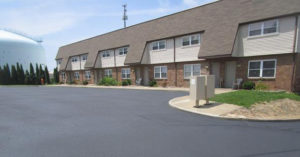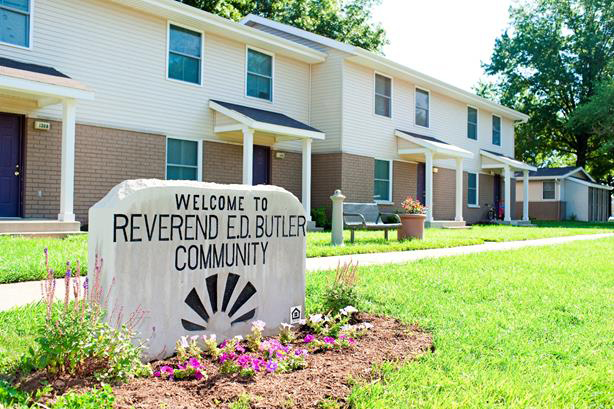The Bloomington Housing Authority announced today the closing of $17.8 million in funding for the preservation and renovation of 116 units at their Reverend E.D. Butler and Walnut Woods Communities in Bloomington, Indiana. Thanks to an allocation of $11 million in Tax Exempt Bond Volume Cap and a low-income housing tax credit allocation from the Indiana Housing and Community Development Authority (IHCDA), and the sale of those credits to Cinnaire for $5.28 million along with construction and permanent financing from BMO Harris Bank for $6.1 million, all units in these former public housing communities will undergo rehabilitation to promote accessibility, energy efficiency and modernization. Site and infrastructure updates are also planned. The City of Bloomington pledged $285,000 in HOME funds and a $215,000 loan from the Housing Development Fund as well as acted as conduit for the tax exempt bonds.
“The RAD program provides communities with a critical financing tool to leverage capital from public and private sources to make much-needed repairs to public housing,” said Keith Broadnax, Cinnaire Senior Vice President. “RAD supports the renovation and enhancement of affordable housing communities while preserving long-term affordability for residents. At a time when many are struggling to pay their rent, preserving and maintaining affordable housing is more important than ever.”
Cinnaire’s involvement in the deal was facilitated by CDFI Friendly Bloomington, a nonprofit dedicated to bringing community development capital to Bloomington and the surrounding region.
“From day one, Cinnaire has been indispensable in our effort to capitalize affordable housing in Bloomington,” said Brian Payne, executive director at CDFI Friendly Bloomington. “Cinnaire’s investment will support BHA’s persistent, laudable work to transform the standard of living for their residents.”
Cinnaire has now invested in both development projects facilitated by Bloomington’s successful effort to become the nations first “CDFI Friendly” city.
 All units in these former public housing communities will undergo rehabilitation to promote accessibility, energy efficiency and modernization. Site and infrastructure updates are also planned. The City of Bloomington pledged $285,000 in HOME funds and a $215,000 loan from the Housing Development Fund as well as acted as conduit for the tax exempt bonds.
All units in these former public housing communities will undergo rehabilitation to promote accessibility, energy efficiency and modernization. Site and infrastructure updates are also planned. The City of Bloomington pledged $285,000 in HOME funds and a $215,000 loan from the Housing Development Fund as well as acted as conduit for the tax exempt bonds.
“My administration has been focused on improving housing availability and affordability for all, and today is important news — at a critical moment– for 116 local families whose homes can now be improved on an accelerated timeline,” said Mayor John Hamilton. “The City is glad to join the BHA and our public and private partners in helping meet Bloomington’s affordable housing challenges, more pressing than ever in the current economic climate.”
“Completion of this phase is the first step in significantly improving the quality of life for all BHA residents,” said William Hosea, Chair of the BHA Board of Commissioners. “Kudos to the BHA, our various partners and the entire development team for your dedication, long hours and hard work in bringing this together. You have the sincere appreciation of a grateful community.”
“This is a major accomplishment with many more to come as we work to preserve our affordable housing portfolio at the BHA that will ensure long-term affordability and set our organization on a path of resilience,” said Amber Skoby, BHA Executive Director. “We look forward to the day when we can all celebrate 116 units of completely renovated affordable housing and vibrant communities our residents feel proud to call home.”
The development team was comprised of the Bloomington Housing Authority and its non-profit development arm, Summit Hill Community Development Corporation, along with Brinshore Development, LLC of Northbrook, Illinois. Bloomington Housing Authority was advised by Kathie Soroka, counsel in Nixon Peabody LLP’s Affordable Housing & Real Estate practice, in the RAD transaction. “Congratulations to the Bloomington Housing Authority on this landmark deal. This deal allows for much-needed rehabilitation to these properties and for its residents, and puts BHA in a more stable position for the future. Preserving affordable housing options for the city is important, especially during this difficult and unprecedented time of social distancing,” added Kathie.
Accessing capital and preserving deep affordability is possible through the U.S. Department of Housing and Urban Development (HUD) Rental Assistance Demonstration Program (RAD). This is BHA’s first of two RAD transactions which enables the agency to receive private, non-HUD funding sources for much-needed physical improvements.
“The Rental Assistance Demonstration allows HUD to preserve and maintain much needed affordable housing units,” said HUD Midwest Regional Administrator Joseph P. Galvan. “Thanks to the public-private partnership that is a key component of RAD, this closing allows the Bloomington Housing Authority to convert 116 units onto the long-term Section 8 platform and ensures permanent affordability to low-income households.”
Subsidy for the units will be covered by a funding agreement for Project-Based Vouchers allowing the project to assist income eligible families. Residents will continue to pay 30% of their income towards the rent and they maintain the same basic tenant rights as they possessed in the public housing program The property is subject to a 40 year HUD Use Agreement that will ensure long-term affordability.
The Reverend E.D. Butler Community, located within the 1200 and 1300 blocks between 11th and 12th Streets on Bloomington’s west side, was built in 1972 and contains 56 units ranging from one, two and three bedrooms. Walnut Woods is located on Bloomington’s south side along Park Avenue and Miller Drive. The community was built in 1982 and has not yet had a major renovation of its 60 one, two and three bedroom units. The first phase of resident relocation on-site is complete with renovations starting mid-May scheduled to be complete by December 2021. Renovations are focused on addressing code requirements, environmental remediation, handicap accessibility, structural repair, unit modernization and energy efficiency. Brinshore Construction Management is the General Contractor.

